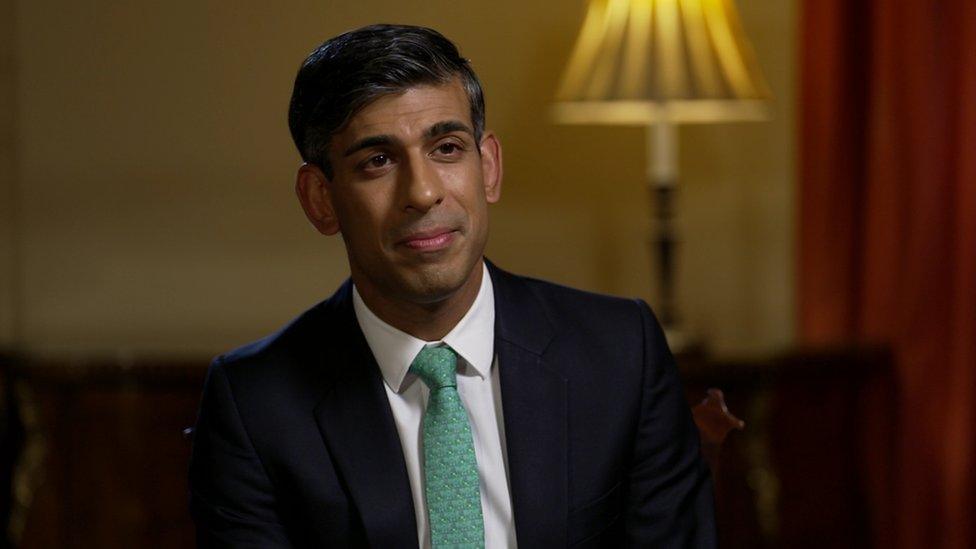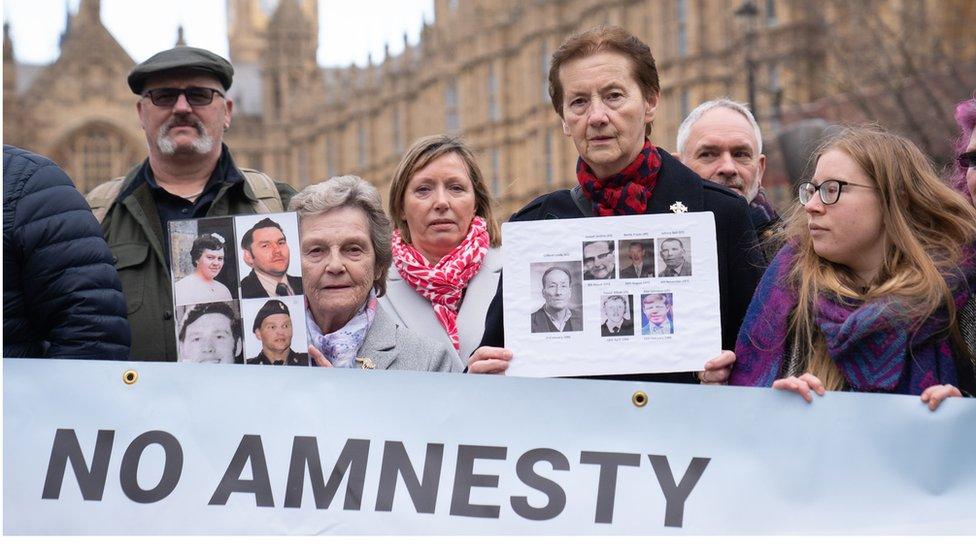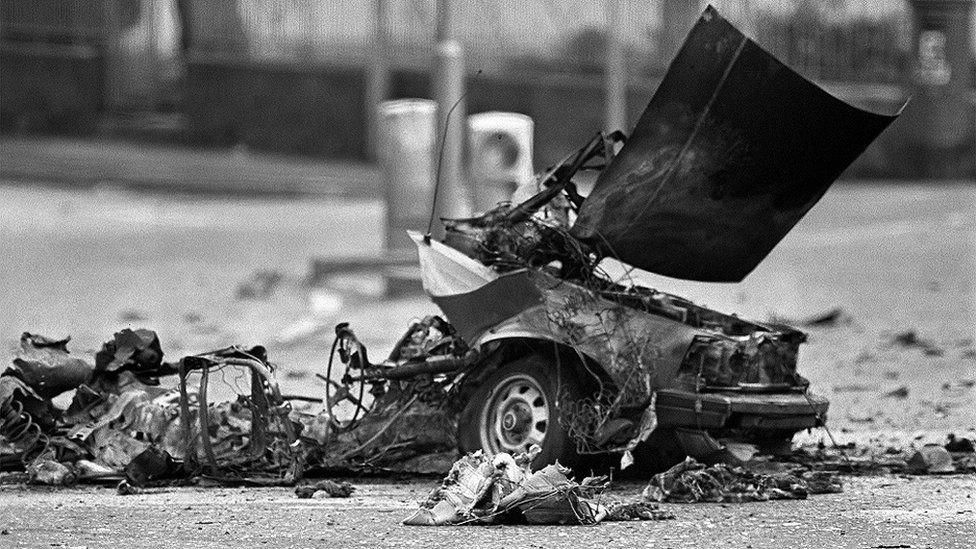Troubles legacy: Controversial bill 'better than what went before'
- Published

Rishi Sunak says no one could defend the previous system
Prime Minister Rishi Sunak has defended the government's controversial Troubles legislation insisting "it was better than what went before".
The controversial bill received royal assent in September last week.
Opponents, including victims groups and Stormont parties, have argued it will remove access to justice. The law is set to face separate legal challenges.
The prime minister believes the legislation is compliant with the government's international obligations.
On the Stormont deadlock and Windsor Framework he said the government was working with "stakeholders" to make "improvements".
Northern Ireland has been without a functioning power-sharing government since February 2022, when the Democratic Unionist Party (DUP) withdrew from the executive due to its protest over the Northern Ireland Protocol.
Mr Sunak refused to say if the government had a plan B if the DUP rejected the latest proposals on the table.
Speaking to BBC Northern Ireland ahead of the Conservative party conference next week, the prime minister accepted the Troubles legacy legislation was "uncomfortable and difficult for many people".
But he added: "I don't think anyone thought the previous system was working well for anybody so we have tried to put in place a system which is better, which will get people the information they need and the justice they deserve while keeping in compliance with our international obligations.
"I appreciate the strength of feeling as these are very difficult choices and are uncomfortable choices but we are trying to make the situation better than it was.
"I don't think anyone can defend the previous system."
The prime minister also defended the role he is playing to try and restore the Stormont Institutions, but refused to say if he has talked directly to the DUP leadership over the past 18 months.
He added: "I don't think anyone could doubt my commitment to Northern Ireland."
'First stumbling block'
After he first entered office he said he made it a "priority to deal with the issues around the protocol which people said could not be done".
"I wanted to do something good for the people of Northern Ireland and remove that as an issue to make sure their place in our union was protected."
He added the Windsor Framework he negotiated with the EU removed the "first stumbling block to an Executive being formed".
"We want to work with all stakeholders to see where we can make improvements and we are working intensely with the parties to encourage them to find a way through.
"Public services are not getting the attention they need right now because there is no functioning executive."
The prime minister also rejected claims from local parties that the Secretary of State Chris Heaton-Harris had imposed a "punishment budget".
He said the government has stepped in to support the people of Northern Ireland with "considerable" extra funding and he said bringing down inflation was the best way to help families deal with the cost of living crisis.

Analysis: A 'well rehearsed party position'
It was a robust defence of his record in Northern Ireland.
But there was no hiding the prime minister's frustration that his greatest achievement has been overshadowed by the Stormont stalemate.
He hasn't been able to fully cash in on the Windsor Framework as it failed to deliver devolution.
That might explain why Rishi Sunak has had no direct dealings with the DUP leadership since the deal was sealed.
He did though point to "improvements" to the framework which he hoped would break the deadlock.
Unlike the Windsor Framework the legacy legislation did not have the full Sunak stamp.
He defended it but stuck to the well-rehearsed Conservative Party position.

What is the background of the legislation?
The Northern Ireland Troubles (Legacy and Reconciliation) Bill was first announced in July 2021 by the then-prime minister, Boris Johnson.
Mr Johnson said the proposals would allow Northern Ireland to "draw a line under the Troubles".
In effect, the legislation would ban on any new prosecutions for Troubles-related crimes and prevent victims' families from seeking fresh inquests or taking legal challenges.
The Conservative government argued that the passage of time had made the prospect of future convictions very unlikely.
It was also facing pressure from its own backbenchers who were opposed to Army veterans being prosecuted over Troubles-era incidents.
However, all of Northern Ireland's main political parties and victims' groups oppose any attempt to ban prosecutions or introduce amnesties.

The Troubles was a period of conflict which lasted for 30 years and cost the lives of more than 3,500 people
What is the purpose of the bill?
Instead of historical cases coming before the courts, the legislation will establish an Independent Commission for Reconciliation and Information Recovery (ICRIR).
The aim of this new organisation is to help families find out more about the circumstances of how their loved ones were killed or seriously injured.
The government argues that the new arrangements will "promote reconciliation" and free the Police Service of Northern Ireland from having to investigate Troubles-era crimes.
But the plans faced strong opposition as the ICRIR will have the power to grant self-confessed perpetrators immunity from prosecution, if they agree to provide a truthful account of their actions.
Related topics
- Published5 September 2023

- Published6 September 2023
